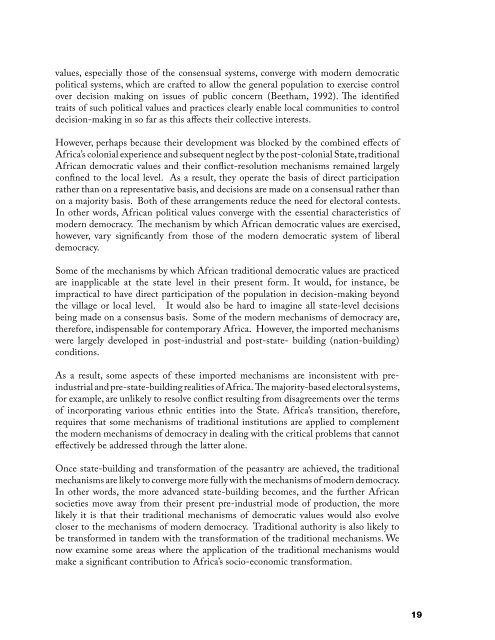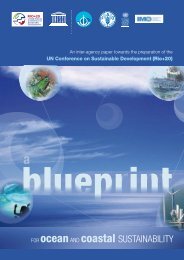Relevance of - United Nations Economic Commission for Africa
Relevance of - United Nations Economic Commission for Africa
Relevance of - United Nations Economic Commission for Africa
Create successful ePaper yourself
Turn your PDF publications into a flip-book with our unique Google optimized e-Paper software.
values, especially those <strong>of</strong> the consensual systems, converge with modern democratic<br />
political systems, which are crafted to allow the general population to exercise control<br />
over decision making on issues <strong>of</strong> public concern (Beetham, 1992). The identified<br />
traits <strong>of</strong> such political values and practices clearly enable local communities to control<br />
decision-making in so far as this affects their collective interests.<br />
However, perhaps because their development was blocked by the combined effects <strong>of</strong><br />
<strong>Africa</strong>’s colonial experience and subsequent neglect by the post-colonial State, traditional<br />
<strong>Africa</strong>n democratic values and their conflict-resolution mechanisms remained largely<br />
confined to the local level. As a result, they operate the basis <strong>of</strong> direct participation<br />
rather than on a representative basis, and decisions are made on a consensual rather than<br />
on a majority basis. Both <strong>of</strong> these arrangements reduce the need <strong>for</strong> electoral contests.<br />
In other words, <strong>Africa</strong>n political values converge with the essential characteristics <strong>of</strong><br />
modern democracy. The mechanism by which <strong>Africa</strong>n democratic values are exercised,<br />
however, vary significantly from those <strong>of</strong> the modern democratic system <strong>of</strong> liberal<br />
democracy.<br />
Some <strong>of</strong> the mechanisms by which <strong>Africa</strong>n traditional democratic values are practiced<br />
are inapplicable at the state level in their present <strong>for</strong>m. It would, <strong>for</strong> instance, be<br />
impractical to have direct participation <strong>of</strong> the population in decision-making beyond<br />
the village or local level. It would also be hard to imagine all state-level decisions<br />
being made on a consensus basis. Some <strong>of</strong> the modern mechanisms <strong>of</strong> democracy are,<br />
there<strong>for</strong>e, indispensable <strong>for</strong> contemporary <strong>Africa</strong>. However, the imported mechanisms<br />
were largely developed in post-industrial and post-state- building (nation-building)<br />
conditions.<br />
As a result, some aspects <strong>of</strong> these imported mechanisms are inconsistent with preindustrial<br />
and pre-state-building realities <strong>of</strong> <strong>Africa</strong>. The majority-based electoral systems,<br />
<strong>for</strong> example, are unlikely to resolve conflict resulting from disagreements over the terms<br />
<strong>of</strong> incorporating various ethnic entities into the State. <strong>Africa</strong>’s transition, there<strong>for</strong>e,<br />
requires that some mechanisms <strong>of</strong> traditional institutions are applied to complement<br />
the modern mechanisms <strong>of</strong> democracy in dealing with the critical problems that cannot<br />
effectively be addressed through the latter alone.<br />
Once state-building and trans<strong>for</strong>mation <strong>of</strong> the peasantry are achieved, the traditional<br />
mechanisms are likely to converge more fully with the mechanisms <strong>of</strong> modern democracy.<br />
In other words, the more advanced state-building becomes, and the further <strong>Africa</strong>n<br />
societies move away from their present pre-industrial mode <strong>of</strong> production, the more<br />
likely it is that their traditional mechanisms <strong>of</strong> democratic values would also evolve<br />
closer to the mechanisms <strong>of</strong> modern democracy. Traditional authority is also likely to<br />
be trans<strong>for</strong>med in tandem with the trans<strong>for</strong>mation <strong>of</strong> the traditional mechanisms. We<br />
now examine some areas where the application <strong>of</strong> the traditional mechanisms would<br />
make a significant contribution to <strong>Africa</strong>’s socio-economic trans<strong>for</strong>mation.<br />
19
















